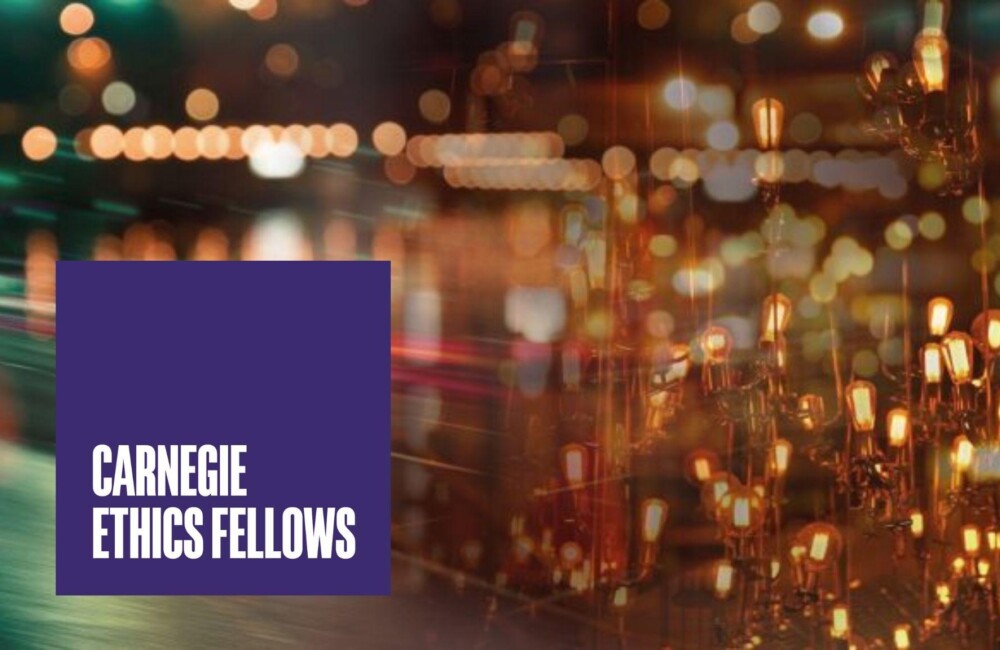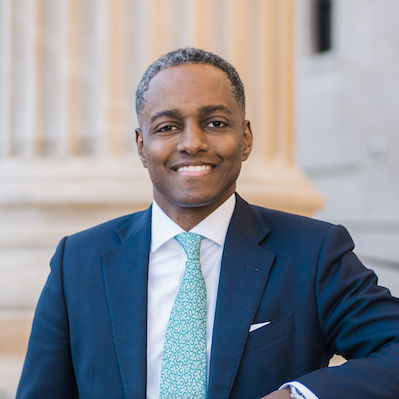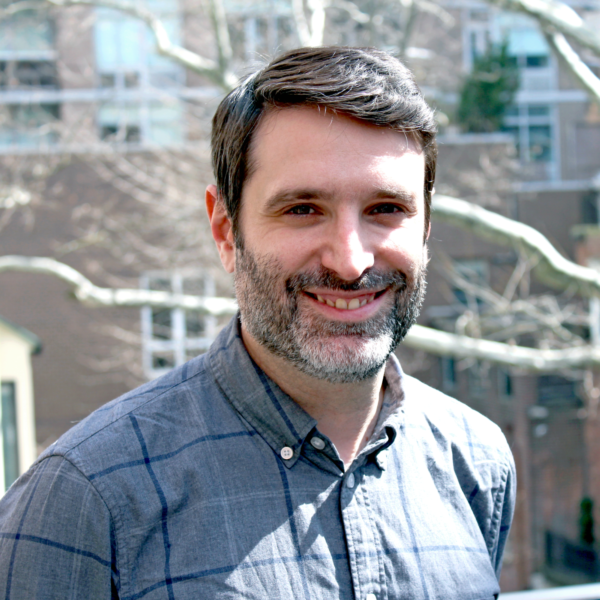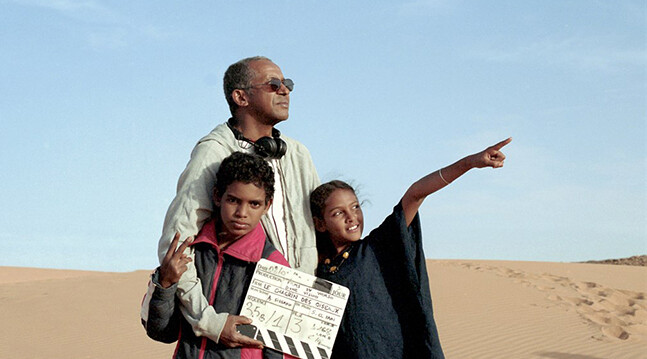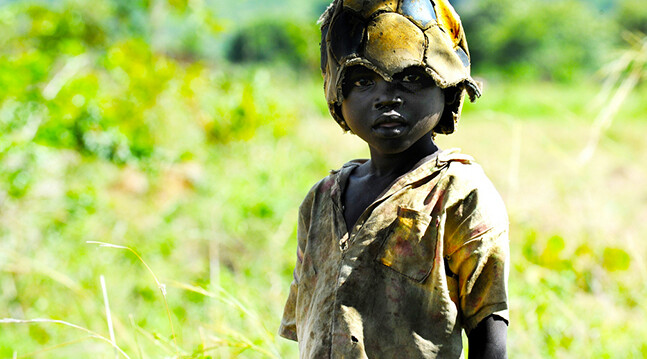"What's been amazing is that across Africa there is a movement where people are adopting technologies and leapfrogging some of the developmental stages that you'd have to go through," says Eddie Mandhry.
ALEX WOODSON: Welcome to the Carnegie New Leaders Podcast. My name is Alex Woodson.
Carnegie New Leaders [CNL] is a membership program for young professionals who are working in a range of fields and wish to engage in a dialogue on ethics and international affairs.Through a series of formal and informal gatherings, CNL members interact with business professionals, policymakers, social innovators, and scholars who are changing the way we approach global ethics in the 21st century.
Today for our first podcast we have Eddie Mandhry. Eddie is associate director of NYU Africa House. Eddie, thanks for coming.
EDDIE MANDHRY: Good to be here.
ALEX WOODSON: So just to get started, why don't you tell us a little bit about your background, what you do at Africa House, and Africa House's mission.
EDDIE MANDHRY: Like you mentioned, I'm the associate director at NYU Africa House. Africa House is an interdisciplinary institute that looks at the political, economic, and cultural trends that are taking shape on the continent and creates a place where people can engage on the issues and transformations in a very formal or informal setting with a variety of stakeholders. So that's what I do, I manage events and programming there and support some of our research activities.
Personally, I call myself a bit of a junkie of international affairs. I love international relations. I studied international affairs. And I'm originally from Kenya. So the matters that are relevant to the African continent are very important to me.
ALEX WOODSON: One of the things that NYU Africa House has been really involved in—it's a big part of your website—is the African Tourism Data Portal. This is a project in conjunction with the African Development Bank.Why don't you tell us a little more about that and what the goal is.
EDDIE MANDHRY: Absolutely. It's part of a two-pronged partnership with the African Development Bank and the Africa Travel Association. We decided to come up with a tourism for Africa data portal and the main thing here is there's not that much information out there about how the tourism sector is affecting African economies. So we figured, why not create a data portal that makes the case for investment in tourism and infrastructure for investment in hotels? And it also makes the case for investing in the human capital that can make the tourism sectors in a variety of parts of the continent more robust.
ALEX WOODSON: What are some of the key things you've learned from this portal? What are some of the things that have surprised you maybe?
EDDIE MANDHRY: I think some of the interesting things we have learned have to do with, for instance, the percentage of African countries whose populations are somewhat connected to the tourism sector. It's a big sector. It's a big foreign exchange earner for many countries. As you might know, Africa has a vast array of natural resources, a very diverse continent with a multiplicity of cultures, languages, World Heritage sites.
So tourism is a primary pillar of transformation on the continent if well executed and well put to use. So we are seeing that with investments in tourism there are opportunities for a lot of jobs in the hotel industry, in the travel and leisure industry, in a variety of other sectors like banking.
And I think there's also a multiplier effect when it comes to tourism because if you have a good airport, it's also an incentive for tourism, for business travelers to come to your country. So if you have good roads and networks, these facilitate trade with different parts of the country and the movement of goods and services across boundaries and borders within the region.
So I think there's many reasons why it's important to focus on tourism as a keystone pillar.
ALEX WOODSON: That's great. I think one of the things that really surprised me looking at the report—this data's from 2011, but according to the information of the data portal, the Democratic Republic of the Congo [DRC] was the fastest growing destination in 2011. Obviously there's been 15-20 years of almost constant warfare in the Democratic Republic of the Congo, I'm not sure how good their infrastructure is—how is this one of the biggest tourist destinations?
EDDIE MANDHRY: That's an interesting question. When you look at the numbers, it's hard to tell precisely what is the trigger for causing that jump. But for instance, very recently there was a documentary that came out called Virunga, and this national park is known to have the gorilla species that is quite rare and could be extinct based on some of the human activities that are taking place in that forested region.
So there are a lot of travelers who care to participate in tourism in an eco-friendly, sustainable way, and in some way help protect some of these national reserves and sites that are not necessarily in areas that are directly in the conflict zone. So that could be part of the reason.
It's a very beautiful country. It's a massive country too, so there are also a lot of people traveling to the country for business. It's got a huge mining sector. And I think sometimes when people travel to places for business they take a few days off to engage in some touristic activities too.
ALEX WOODSON: Do you think this has had any kind of positive effect on the Congolese society in maybe the last five to ten years? Has it maybe brought money into different sectors? Are there any effects beyond people seeing the beautiful gorillas in the countryside?
EDDIE MANDHRY: I think the issue of governance comes in to play and the extent to which governments are the beneficiaries or the custodians of tourist activities. They charge the commissions and they get the fees from tourists when they land in the country. If they convert that into sustainable programming initiatives to invest in tourism infrastructure, yes it can have an impact. But I think there are significant challenges that the DRC is facing in the areas of governance, political participation, and security that make it very difficult trend to sustain.
ALEX WOODSON: Another country bordering DRC that also has governance issues is Uganda. And you were just in Uganda in November for a conference on tourism. As someone who is interested in African current events, one of the things that bothers me about Uganda is their stance of homosexuality. I believe homosexuality is a crime in Uganda. There have been a bunch of different bills—I'm not sure of what the status of them is right now—and President Museveni has made anti-homosexual remarks.
What are the ethical implications of traveling to Uganda? Should tourists feel comfortable traveling like this where they know a large segment of the population is criminalized?
EDDIE MANDHRY: Excellent question. Like Uganda, several other countries on the continent have governments that sometimes align themselves with constituents within their citizenry who have specific views and values that might not necessarily fit into the global framework of values and human rights.
So in my estimation, I think Uganda has a lot to offer. The issue of the gay bill is a serious one, a very serious one, for democracy and human rights within Uganda. Nonetheless there are opportunities to engage with this issue by supporting the activists on the ground who are working tirelessly to change minds, to change attitudes. It's something that takes time. But then again it's something that requires effort that's potentially driven externally but also supported internationally.
So it's a testament to the need for all of us to work together to address some of these issues. Uganda does not exist in a vacuum. It's part of the international community. There are many mechanisms through which the international community can bring pressure to bear when there are instances when governments assume positions that might be contrary to the rights that a lot of us aspire to in 2015.
I think, yes, we are heading in the right direction. There are several countries around the continent that have very progressive frameworks of law that protect gay rights. But Uganda seems to have backtracked on this issue.
ALEX WOODSON: Another country I want to talk about is your home country, Kenya. I know, for me growing up, Kenya was looked at as the main tourist destination in Africa. Nairobi's a big hub of a lot of different industries, and obviously the safari is a huge tourist attraction. But in the past couple years, there have been real security concerns in Kenya.
What would you say to people who are interested in going to Kenya, but might be a little unsure of the security situation there? Is it still safe to go? Can tourism help the situation?
EDDIE MANDHRY: Tourism, like you mentioned, is a cornerstone sector for Kenya. Kenya, without bias, is one of the most beautiful countries on the continent, even though I'm from there. There's a tremendous array of opportunities for people to experience the beauty of the culture, the people, and the topography and geography of the country.
Now, we have had a problem with security. The al-Shabaab menace has been a persistent issue. I think you will recall the Westgate Mall attacks that devastated our capital city Nairobi and sent shockwaves through the region.
Nonetheless, I think, similar to the United States after 9/11—after 9/11, no countries sent out advisories against traveling to the United States. In fact, I think it created a movement of solidarity with the people of New York.
So in instances where there are terrorist attacks in Africa, I think what would be prudent would be for countries, rather than set advisories to their citizens about travel to Kenya or wherever else, they should encourage them to travel. Because if you don't do that, you are letting terrorism win. You're giving terrorists the upper hand and you're acknowledging the fact that you've instilled fear, that people would stop doing the things that they would normally do.
You know, when there were attacks in France very recently, at the Charlie Hebdo newspaper, heads of state from several countries around the world rallied in Paris. We need to have instances like that when terrorist attacks happen in Kenya too.
ALEX WOODSON: Very true. Just the last question about this. We were talking before the podcast about some of the information, how it takes a little while to filter in. Is there anything you've seen in the last few years about some country that most Americans or most Westerners aren't really thinking about when it comes to Africa? Maybe one that you think would be a really great place to go to get a sense of this region?
EDDIE MANDHRY: I've been fortunate to travel widely in Eastern Africa and parts of Southern Africa, and a bit of West Africa as well. And I sometimes feel like I've barely scratched the surface. For American tourists, one of the challenges is that not all of Africa is Anglophone. So there tends to be an imperative to go to the English-speaking countries around the continent and avoid the Portugeuse-speaking countries like Angola, Mozambique, that are tremendously beautiful. Countries like Cape Verde off the coast of West Africa—that's absolutely magnificent—Madagascar, Seychelles, you have Zanzibar off the coast of Tanzania.
So if someone is willing to step outside their comfort zone and experience something new, new culture, new language, you might experience something that's a pleasant surprise. I think also English is becoming the lingua franca of the world, so even in countries that may not have English as an official language, there may be a significant population of people who are starting to speak English as an alternate language as well, because it's the language through which a lot of commerce is taking place around the world.
ALEX WOODSON: I'd like to move on to another big initiative Africa House is working on, which is a variety of ways you're looking to help small farmers. Specifically you're looking at the Commodity Exchange in Ethiopia, which you told me is the largest commodity exchange in Africa. It opened in 2008. So I know there are a lot of issues around—just like as in the United States—making sure that someone who's not working for a large conglomerate can make a living as a farmer. So what is Africa House doing specifically with the Commodity Exchange to help small farmers in Ethiopia?
EDDIE MANDHRY: Our partnership with the Ethiopia Commodity Exchange or ECX came out of the notion that it would be important in order to improve the exchange, to figure out what's working and what's not, to evaluate the impact that it's having. And particularly of interest to the director of NYU Africa House—he's an economics professor from Ghana; his name is Yaw Nyarko—of interest to him is what impact the exchange is having on smallholder rural farmers.
A lot of the farmers who produce coffee, which is one of the number one exports of Ethiopia, do so in very small farms in very far-flung parts of the country that create inefficiencies in the market. So a lot of farmers find it very difficult, for instance, to transport their product from their little farm to a cooperative or a market in a small town that would later relay it to the capital city.
So Ethiopia instituted really interesting innovations that created a network of warehouses around the country. They created an electronic system, a receipting system where farmers bring their sack of coffee to the warehouse, they get their receipt immediately, which tells them precisely the grade of their coffee and also gives them money immediately for their product. This is something that would take a really long time in the past prior to the institution of this system.
Another thing that's been revolutionary is creating price transparency so farmers know precisely what the market prices are for their coffee. And this is having very positive impacts on the ground.
ALEX WOODSON: There are a couple of other technology initiatives that you're working on with Africa House in connection with rural smallholder farmers. One of them that I thought was especially interesting is the mapping technology. Would you tell me a little bit more about that and how that is really having an effect on farmers' lives?
EDDIE MANDHRY: We have been developing in partnership with our Center for Technology and Economic Development based out of NYU Abu Dhabi, and with faculty who are part of the mathematics department, the Courant Institute at NYU, as well as faculty in economics and students in economics to come up with an app that measures—it's essentially a GPS [global positioning system] app on an Android phone that you can use by navigating the perimeter of your farm, uploading data and then getting back information that tells you your precise location within the context of the village, town, city, the country, as well as the size of the area that you walked around.
And this is extremely important for farmers to know exactly how large their pieces of land are so they can figure out precisely the best way to use it, what kinds of fertilizer to use on their land, but also to address issues that come up often—issues of dispute around boundaries: My farm kind of goes over your farm so you have problems with me and that creates some significant conflicts.
Also, when it comes to inheritance, a lot of farmers tend to give their land to some of their descendants. And that can create some issues if you don't have a real boundary. And sometimes the problem we run into is people expect us to have an app that can chart their farm in a way that's legally binding. But we are not providing them with legal documents, we are helping them with research here, so that can be a little bit tricky at times.
ALEX WOODSON: So what has been the reaction—I know that you traveled to Ethiopia last summer. Was it in connection with this project?
EDDIE MANDHRY: It was actually for a different conference so it wasn't in connection with this project. But I was in Ghana a coupe of months ago in connection with this project.
ALEX WOODSON: Did you talk to farmers who were using this technology?
EDDIE MANDHRY: Absolutely.
ALEX WOODSON: What did they say about it?
EDDIE MANDHRY: The farmers are extremely excited about knowing the demarcations of their land. A lot of times they don't have a fence around their farmland so they're very eager to get a certain document that is verifiable and that is an assembly of data points generated by GIS [geographic information system] satellite technology. When they hear that they're like, "This is foolproof." Nonetheless, technology has glitches so we're trying to iron out those glitches and make sure we don't present farmers with information that's misleading.
So it's an ongoing project. We've presented them with some of our data. They give us feedback. At the same time, we're very well aware, this has to be complementary to some of the title deeds and boundary dispute resolution mechanisms that exist in the communities.
ALEX WOODSON: Is there any resistance to some of these technologies? I would imagine maybe coming in saying you're from NYU and going to a small farm in Ghana, or pretty much anywhere in the world, someone could be very suspicious of that.
EDDIE MANDHRY: That's a good point. We spend a lot of time cultivating partnerships with local community leaders, local community stakeholders to make sure that we're not parachuting in with interventions that claim to bring the farmers in Africa certain benefits that they didn't have before.
I think a lot of development practice tends to have this condescending attitude that local stakeholders are simply the passive beneficiaries of interventions by foreigners or external actors. For us, it's of principal importance to have a partnership, a collaboration where their information, their insights, their knowledge is what informs the development of our interventions and supports.
So we work very closely with the Ministry of Food and Agriculture in Ghana. They have extension officers who go out into the farms and work with the farmers on a very regular basis who know them very well. And in that respect, there's a necessity to build trust and understanding and awareness in terms of what our priorities are and how we could possibly provide benefits to them.
So, yeah, that's a very important point. There is sometimes skepticism when foreigners just show up and sometimes whatever they promise never materializes.
ALEX WOODSON: Have you been able to see tangible results from these initiatives—also the one in Ethiopia—or is it too early for that?
EDDIE MANDHRY: For instance, we have another evaluation project we conducted with a company called Esoko. The company's mission is to provide price alerts via text message to farmers. So if a farmer has cultivated cassava, or plantains, or bananas over the last six months and they have a stock of 400 pounds of cassava, they can request a text message alert that tells them the market price for that commodity.
That is extremely important, especially when a lot of farmers used to interact with middlemen who would be very vague and cryptic about the market price and, for the most part, would undercut the prices and give the farmers far less for their product.
So in that evaluation, we have definitely seen a tremendous impact in the number of farmers that receive price alerts and now feel they are receiving the true price for their commodities.
ALEX WOODSON: These initiatives are pretty much using technology in places it might not have been used before—were these ideas developed at Africa House or were there other organizations that you look to to implement these things?
EDDIE MANDHRY: I think sometimes there's no reason to reinvent the wheel. There are a lot of organizations that are doing a tremendous amount of work developing new technologies. What's been amazing is that across Africa there is a movement where people are adopting technologies and leapfrogging some of the developmental stages that you'd have to go through.
For instance, in mobile connectivity, mobile phones, the average African has 2.1 mobile phones. That means they have 2.1 sim cards that they interchange between various phones because they get better rates from one over the other. So mobile connectivity in some countries is still low, but in other countries like Kenya, it's extremely high, over 80 percent. Technology could be used in many ways and people are very open to that, given the fact that they've already begun to benefit so much from that.
For instance, in Kenya, there is a company called M-Pesa, which is basically a money transfer system through mobile phones. It's been exceptionally successful. People get their salaries paid via text message with a pin code and they can go and cash out wages within seconds.
So it's very exciting to see where this might go for the continent.
ALEX WOODSON: Just to wrap up here, what are you looking to in the future at Africa House? Do you have any big trips planned? Any initiatives that you're starting to work on?
EDDIE MANDHRY: At the moment, we're just focused squarely on the work we've done with the Ethiopian Commodities Exchange. We will be having some training and capacity-building workshops.
What is taking shape now around the continent, are various initiatives by different countries to set up their own commodity exchanges. The Ghana Commodity Exchange is being developed at present. Cameroon is thinking of setting up an exchange and they're working with the person who set of the Ethiopia Commodity Exchange to set up their own. The former U.S. secretary for African affairs, Jendayi Frazer, has partnered with the Tony Elumelu Foundation— Tony Elumelu is a Nigerian philanthropist—to set up an African Exchange in Rwanda. There's the East Africa Exchange that has been set up in the last couple of years.
So there's a lot of movement in that direction and we'll be focusing a little bit of our effort in the coming months on adding value in that sphere.
ALEX WOODSON: I think that about wraps it up. Anything we missed, anything you want to add about your work?
EDDIE MANDHRY: No, it's been a pleasure and I thank you for the opportunity.
ALEX WOODSON:Thank you very much.
That was Eddie Mandhry, associate director of NYU Africa House.
This has been the Carnegie New Leaders podcast. I'm Alex Woodson. You can find this podcast and many others at carnegiecouncil.org. You can also find us on iTunes. Thanks for listening.
